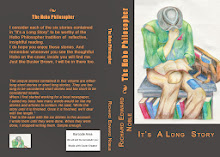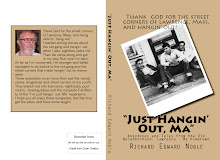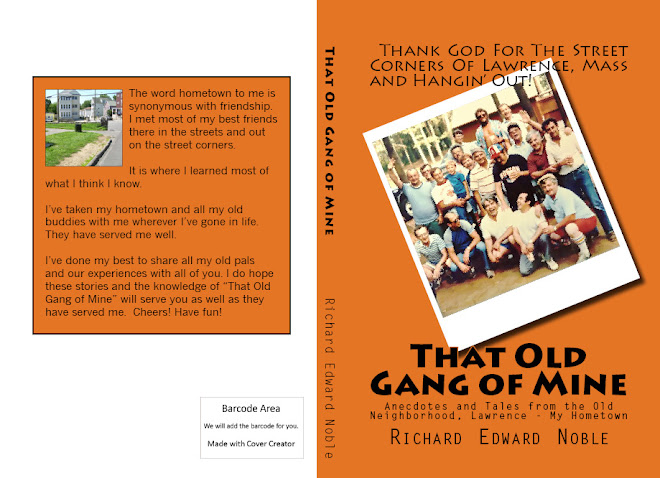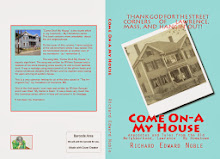
John Fitzgerald Kennedy
A Memoir
By Richard E. Noble
The phone rang in our little kitchen. We lived in a tiny apartment in Lawrence, Massachusetts. I spent the first twenty seven years of my life there. It was a mill town with layer after layer of blue collar tenement houses. My mother rarely answered the phone. It was usually never for her but someone calling for one of us kids. We all rushed to her side, ready to grab the phone when she said for whom the call was actually intended. But we were all stopped short, as she hung onto the receiver and began to speak;
“Yes, I know who you are, Bobby. Yes, I know that it is your brother, John, who is running for president.”
“What the ...? Who are you talking to Ma?”
“She’s talking to Bobby; you know Johnny’s brother.” We all laughed, as she went on as if she were talking to one of our school chums.
“Yes, I realize that tomorrow is Election Day ... Oh yes, I certainly intend to vote for your brother. I understand ... Yes, I certainly will ... I will ... I will! I’m going to be there the first thing in the morning. I wish you and your brother the best of luck ... Oh, don’t you worry Bobby; you have my vote.”
Bobby Kennedy had called our house the night before his brother was elected President of the United States.
J.F.K was one of us.
An Irish Catholic, Massachusetts boy, was going for the presidency. This was as close to home as it could get; our little State, our maligned faith, our dumpy neighborhood, our blue collar apartment in the inner-city slum, and our telephone. It was unbelievable. My mother was talking to Bobby about the election; my mother who was probably the least political person that I have ever known. But, that next morning she donned her winter coat and hat and went prancing off with her pocketbook hanging on her arm. I ran out on the porch. I didn’t know whether to cheer, applaud or what. She looked like a miniature Eleanor Roosevelt parading down Chelmsford Street to the corner where they were all lined up at the voting station.
She had received her orders and was marching to her destiny which was to personally elect John F. Kennedy president. And she did it. It was the closest election of the twentieth century thus far.
Johnny won by slightly more than 100,000 votes. He was the youngest man yet to be elected president - the first Catholic president. And though I was just slightly too young to vote for him myself, he was my president also.
He was the president of all the young people. He was as sharp as a tack. He knew his ABC’s. He had all the answers. The press was no match for him. He was smarter than they were. He smiled, had a huge grin and told jokes about his dad and his wife and brothers and sisters. He was a big tease, just like your older brother, or your own dad. He was a hero during the War. I went to see the movie PT-109 at the local movie theater. I bought his book, “Profiles in Courage”. I still have a copy. It was a real book.
“Profiles in Courage” was no political biography book about how I was born in a log cabin. It was not about himself. It was about men in history who had acted courageously, even if it meant their political careers. John F. Kennedy was more than another pretty face.
“Profiles in Courage” was a book about ideals, about principles. It became a TV series. I can remember lying on the parlor floor with my head up against a hassock watching this week’s excerpt with the whole family. At the end of each episode there was somebody crediting John F. Kennedy, and some bit of his personal idealistic inspiration. If I’m not mistaken, he introduced the show, or signed it off - or something.
John F. Kennedy, the War Hero, who had saved his buddies; the intellectual and Harvard graduate, the Journalist, the TV show writer, the first Catholic president, the youngest elected president, the family man with a picture book wife and regular kids hiding under his desk at the White House, the little rich boy who had a feeling for the working stiff. John F. Kennedy, the man who was going to bring peace to the world at last.
By the time I got to college everybody was enrolling in the Kennedy Army for Peace. They called it the Peace Corps. They say that it was really Hubert Humphrey’s idea, but it was Kennedy who pushed and promoted it. Every student that I talked to was joining the Peace Corps. They were all making me feel guilty and hypocritical. Finally we had a president who stopped the tradition of talking about peace while making war; a president who was going to turn it all upside-down. He was going to actively make peace and try to keep the war mongers talking. The whole world got his message and everybody was cheering - except the Russians and Fidel Castro.
Then suddenly it was eyeball to eyeball. The end of the world was on the horizon. But this was O.K. It was all for one and one for all. It was no pull-a-name-out-of-a-hat deal. If we were going to die, we were all going to die at once - BOOM! And who gives a damn. It was a relief. No more hiding under the desks, or looking for a designated bomb shelter, or storing up supplies in the cellar, or contemplating a slow death by some kind of horrid radiation poisoning. If the world really couldn’t be saved, then let’s end it, once and for all. We would prove T. S. Eliot wrong. The world wouldn’t end with a whimper but a BANG! We finally got this chicken-chicken stuff over with. Khrushchev pushed, and Kennedy pushed back - the Cuban Missile Crisis.
When it was over Khrushchev had blinked. Russian ships were on the TV loading up their ships and heading home with their bombs and missiles. Kennedy had stood up to the bullies and they were tucking their missiles between their legs and heading back to their own school yard. If there was anybody who doubted Kennedy’s policy at that time, I don’t remember that they had time to voice their opinion. The missiles were there; we were on the brink of destruction, and then it was over. It was scary, but we all went through it together - holding our breath.
I have heard many say that Kennedy did it all wrong, we should have invaded Cuba and put Castro to rest. But information from the Russian Archives has since proved that Mister Kennedy and his brother were more than correct. The Russians had tactical nuclear weapons on Cuban soil and submarines off the East Coast of the U.S. with orders to fire if the U.S. had attacked. And due to problems in the Russian communications system the order to retaliate had been given by Khrushchev and couldn’t have been changed in time to stay a holocaust. The East Coast of the United States from Washington D.C. to Tampa Florida would have been gone - along with a heck of a lot more. The incident scared the heck out of both Kennedy and Khrushchev and they consequently had the infamous hot lines installed.
But, Kennedy was a president to whom the presidency wasn’t the culmination of his life and career. He was too young. He was just starting. He was going to really be something special. He would write history or be a movie star, or teach at Harvard. The presidency was just a stop on his way to bigger and better things and everybody knew it.
I was in my college History class at Northern Essex Community College. It was a renovated Haverhill grammar school. It cost me one hundred and fifty bucks a semester. I had a 1946 Desoto, fluid drive that had to be jump-started every day. I parked it on a hill outside the school and everybody watched and laughed each day as, my buddies and I, all pushed it down the hill to get it rolling and then jumped in when I popped it to a start. It was bright yellow, and we called it the Banana Boat. A phrase made popular a few years earlier by Harry Belafonte. This new junior college and the state-wide junior college program was one of Kennedy’s new ideas. A kid of my Class, and my finances, and my academic background had very little hope of getting a college education.
A young office worker stepped into our classroom, unannounced. He walked up to the teacher’s desk and handed him a piece of paper. The teacher read the note, silently. Then he looked up at the class, and spoke:
“The president of the United States has just been shot in Dallas, Texas. The class is dismissed”.
A boy in the back of the class jumped up and started mumbling something about his tuition and that he was paying that teacher’s salary and he wanted the class to continue. The teacher repeated; “Class dismissed.” Then he turned and started gathering things up from his desk. The mouthy boy kept grumbling. He grumbled all the way down the corridor and out into the school yard. In a matter of seconds he had a crowd around him and was in a fist fight.
In the cellar of the grammar school we had a small make-shift cafeteria. It was just vending machines, a small bookstore and a couple of TV’s. We were glued to the TV’s. The girls were all in tears and sobbing. Their eyes were all wet and raw and their noses red from the constant use of tissues and table napkins.
My father had died suddenly and without warning a few years earlier. This assassination was the exact same experience all over again. Once again I was waiting for the doctors to announce that everything would be all right and that he would live, but just as with my dad, this wasn’t to be the case.
I was stunned in the same way as I had been with my dad when they announced that the president was dead. But, I was steeled to the concept of death now. I had no tears. I had no why’s. Death has no explanation. The Nation would go on as it did after Lincoln, after Garrison, after McKinley. It would go on as it has after all the different presidents who had been killed or who had died in office. We had a system, and the system would go on; just as my life had gone on after my father’s death. Just as everyone’s life continues and goes on after the death of any loved one. You have no choice.
But a lot of dreams would now die and be forgotten.
At my father’s funeral, they kept saying; - He was so young - and I thought, silently; does death have an age limit? Is anyone too young or not old enough to die? Hardly. Here was the hope of the world and he had just had his head blown off in Dallas, Texas.
Watching the funeral on the TV was tragic. Little John-John being prodded forward by his mother and saluting the coffin; the horse with no rider; the hauntingly slow, and penetrating cadence of the drums - a whole nation in mourning. The memories of those days never seem to die.
Maybe they’re not supposed to.
John F. Kennedy holds the unique distinction of being the only president to be assassinated more than once.
He was first assassinated on November 22, 1963 when he had his head blown off in Dallas, Texas. Since that initial assassination, John F. Kennedy has been slowly assassinated, day by day, by the written word in newspapers, periodicals, books, and documentary films in what seems to me to be an attempt to prove to us, the American people, that John F. Kennedy was such a terrible man that he really deserved to be killed in the first place.
I view this with the same attitude that I have learned to view rape. It doesn’t matter if she looks like a whore, acts like a whore, or even if she is a whore, no man has the right to take her without her voluntary consent.
Somebody murdered a president of this United States, and not only got away with it, but has since convinced us Americans that it doesn’t even matter.
John F. Kennedy, no matter what his character faults, did not deserve to be murdered. He may have been an S.O.B., but, as someone has said before me, he was our S.O.B. And if our government knows what happened, it is time that we were informed and the information, at least, made available to our historians. I feel that I have a right to know the truth before I die. The time is here.
The suspects in the murder of J.F.K. include nearly everyone. The only prominent person or group not yet accused of the crime, I think, is the Pope.
Things we know: The Warren Commission Report was a blatant cover-up. The autopsy was fudged. There was more than one gunman. It now seems that there were so many bullets fired, one wonders how innocent by-standers weren’t hit - Oswald’s nest, the grassy knoll on the right; the grassy knoll on the left; somewhere from the front; somewhere from the back; from the sewers. Assassins seem to have been all over the place. Shoplifters got better police protection than Oswald received walking up that ramp to his death at the hands of Jack Ruby. Who are they kidding!
To me, one thing does seem to be certain here. A whole bunch of prominent people have been lying on this matter. Why?
Americans have the right to know their own history. Open up all this secret stuff and, at least, let the academics in. Most everybody involved is probably dead by now. It won’t change anything, but it should be important to a people who keep making claim to be living in - the land of the free and the home of the brave.





































